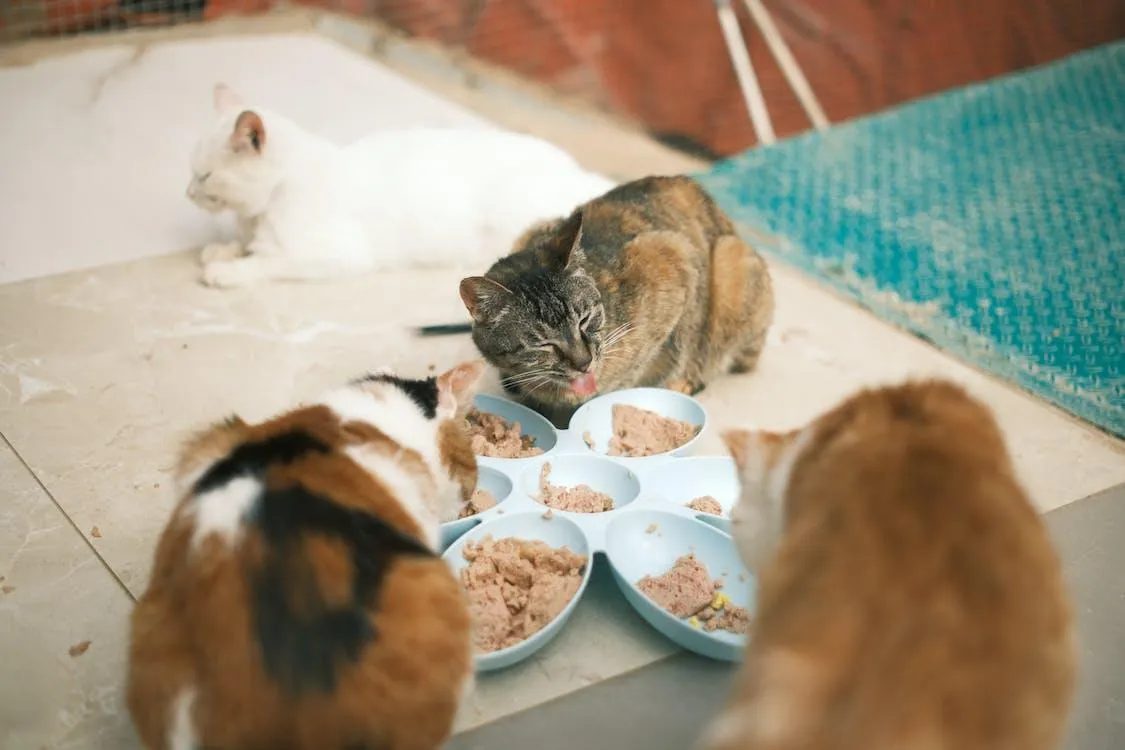

Feeding / Weight
Feeding a cat and maintaining a healthy weight is crucial for their overall well-being.
Here is a comprehensive guide on what cats need and
how to ensure they maintain a healthy weight:
There are 2 main types of Food:
Commercial Cat Food: High-quality commercial cat food is the most convenient and balanced option when it comes to feeding your cat. It comes in three main forms: dry kibble, canned/wet food, and semi-moist. Look for brands with meat as the primary ingredient and limited fillers, especially cereals and grains. I personally use Orijen or Acana for my fur babies.
Homemade Cat Food: If you're preparing your own cat's food at home, consult with a veterinarian to ensure it meets their nutritional requirements. There are certain vitamins and minerals that are vital for cats.
Balanced Diet: Cats are obligate carnivores, meaning they require a diet primarily consisting of animal-based protein. Ensure that their food meets the minimum protein requirements. Provide essential fatty acids and amino acids, such as taurine, which are crucial for their health. Offer a variety of proteins to prevent boredom and to ensure they get a range of nutrients. NEVER feed a cat a vegetarian diet, regardless of your personal preference!
Portion Control: Follow the recommended feeding guidelines on the cat food packaging, but adjust as needed based on your cat's age, size, activity level, and overall health. Overfeeding can lead to obesity, while underfeeding can result in malnutrition.
Feeding Schedule: Cats benefit from regular feeding schedules. Adult cats can usually be fed 2-3 times a day. Kittens and very active cats may require more frequent meals.
Water: Ensure access to clean, fresh water at all times. Cats can be prone to urinary tract issues, and adequate hydration is essential.
Treats: Limit the number of treats and avoid feeding too many human foods, as they can be high in calories and may not provide the necessary nutrients. Try to use natural treats where possible.
Weight Management: Obesity is a common issue in cats and can lead to various health problems. It's crucial to monitor your cat's weight. If your cat is overweight, work with your veterinarian to develop a weight loss plan, which may include adjusting their diet and increasing physical activity. It can be dangerous for cats to lose weight too quickly, so this is something that needs to be closely monitored.
Special Dietary Requirements: Some cats have specific dietary needs due to allergies, sensitivities, or medical conditions. Consult your veterinarian for guidance if your cat falls into this category.
Avoid Toxic Foods: Some human foods, such as chocolate, grapes, and onions, can be highly toxic to cats. Avoid feeding them these items, and learn which foods to avoid.
Monitor Health: Keep an eye on your cat's overall health. If you notice sudden changes in appetite, weight, or behaviour, consult a veterinarian, as these could be signs of underlying health issues.
Transitioning Diets: When switching your cat's food, do so gradually over several days to avoid digestive upset. The usual rule of thumb is to gradually mix the new food in with the current food, slowly increasing the amount of the new food.
Senior Cats: As cats age, their dietary needs may change. Consult your vet to determine the best diet for your senior cat.
Remember that individual cats may have unique needs, and it's essential to work closely with your veterinarian to develop a feeding plan that ensures your cat maintains a healthy weight and overall well-being. Regular check-ups and open communication with your vet are essential in providing the best care for your feline friend.